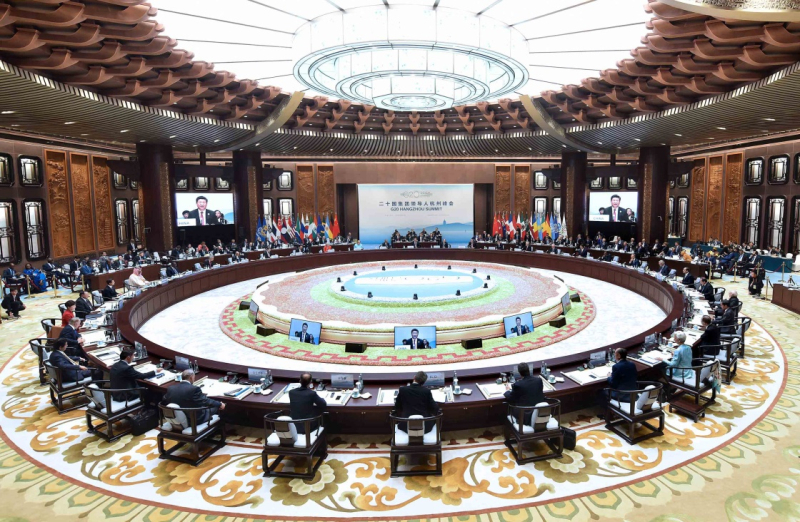G20 Hangzhou Summit paves way for global economic governance, cooperation

Chinese President Xi Jinping addresses the opening ceremony of the 11th G20 Summit at the Hangzhou International Expo Center on Sept. 4.
Leaders of the G20 members and guest nations as well as heads of international organizations gathered in Hangzhou from Sept. 4 to 5 to focus on the most pressing challenges facing the world economy and lay groundwork for future global economic governance and international cooperation.
The 11th summit of the G20 was the organization’s most fruitful to date. It also involved the most developing countries, making it more representative and inclusive than ever.
The G20 has become one of the three primary forums for global governance to emerge in the wake of World War II, in addition to the United Nations and the G7.
Governance mechanisms like the Western-dominated G7 are in essence exclusive “clubs for rich countries,” noted Guo Shuyong, dean of the School of International Relations and Public Affairs and director of the G20 Research Center at Shanghai International Studies University.
Wang Jinliang, a lecturer at the Political Studies Institute under the East China University of Political Science and Law, said insufficient legitimacy, representativeness and governance capacity have hindered the ability of Western-led governance mechanisms to handle urgent global challenges.
Global governance is not synonymous with “Western governance,” still less with “hegemonic governance,” Wang said, calling for a better system since governance by Western powers or great-power groups is hardly effective.
Because the G20 was able to rally the international community in response to the 2008 global financial crisis, it was elevated to the level of an annual summit for heads of state thereafter.
The mechanism is now extensive and representative, covering two-thirds of the world’s population and 60 percent of the global land area, and the trade volume accounts for 80 percent of the world’s total. The G20 Hangzhou Summit has also sent a signal to the international community: the organization exists to serve not only its 20 constituent countries but also the world as a whole, scholars said.
“Current global governance calls for international coordination, and China as part of the G20 has played a vital role in this capacity,” said Pang Zhongying, a professor from the School of International Studies at Renmin University of China.
Assuming the presidency of the summit in 2016 has presented another big opportunity for the country to exercise its power to lead, which has significant and far-reaching implications for the transition of global economic governance, Pang said.
A crucial member of the group, China is not only a participant, constructer and beneficiary of the international system, but is considered by academia as the greatest contributor to the G20’s comprehensive development strategy.
Wu Zhicheng, dean of the Zhou Enlai School of Government at Nankai University, said that China has made full use of the platform since it was launched, taking active actions in global economic governance, institution building, coordinated development and conceptual innovation.
With the G20 as the platform, the nation has made remarkable contributions to world economic growth by providing global public goods for the international community, accelerating the reform of the existing global economic governance framework and promoting effective connection to new international systems initiated by emerging countries, Wu said.
Moreover, it has also coordinated relations among developed and developing countries within the G20, advanced the development agenda of the mechanism with the help of the BRICS, integrated and shared Chinese ideas on global governance, Wu added.
Scholars said that the G20 Hangzhou Summit has upgraded the platform into a “major forum for international economic cooperation,” thereby boosting the effectiveness of global economic governance, expediting the modernization of the existing governance organizations and forging the G20 into “a mechanism for global coordination in the 21st century.”
Pang said the G20 will be a “committee for steering the global economy” that has a higher status than other similar forums.
The G20 has broken the traditional mentality in mechanism construction and shifted the focus from form to function, building a series of functional institutions to realize its goals, said Xu Xiujun, an associate research fellow at the Institute of World Economics and Politics at the Chinese Academy of Social Sciences.
Xu lauded the addition of a regular trade ministers meeting to the G20 cooperation framework as a breakthrough, adding that the institutionalization of many taskforces has also made the mechanism more functional.
The G20 Hangzhou Summit, as a gathering for global governance, has further highlighted the advantage of the platform in the global governance system and orchestrated the birth of a new one, Guo said.
Zhang Junrong and Lü Mengdiis are reporters at the Chinese Social Sciences Today.

 PRINT
PRINT CLOSE
CLOSE